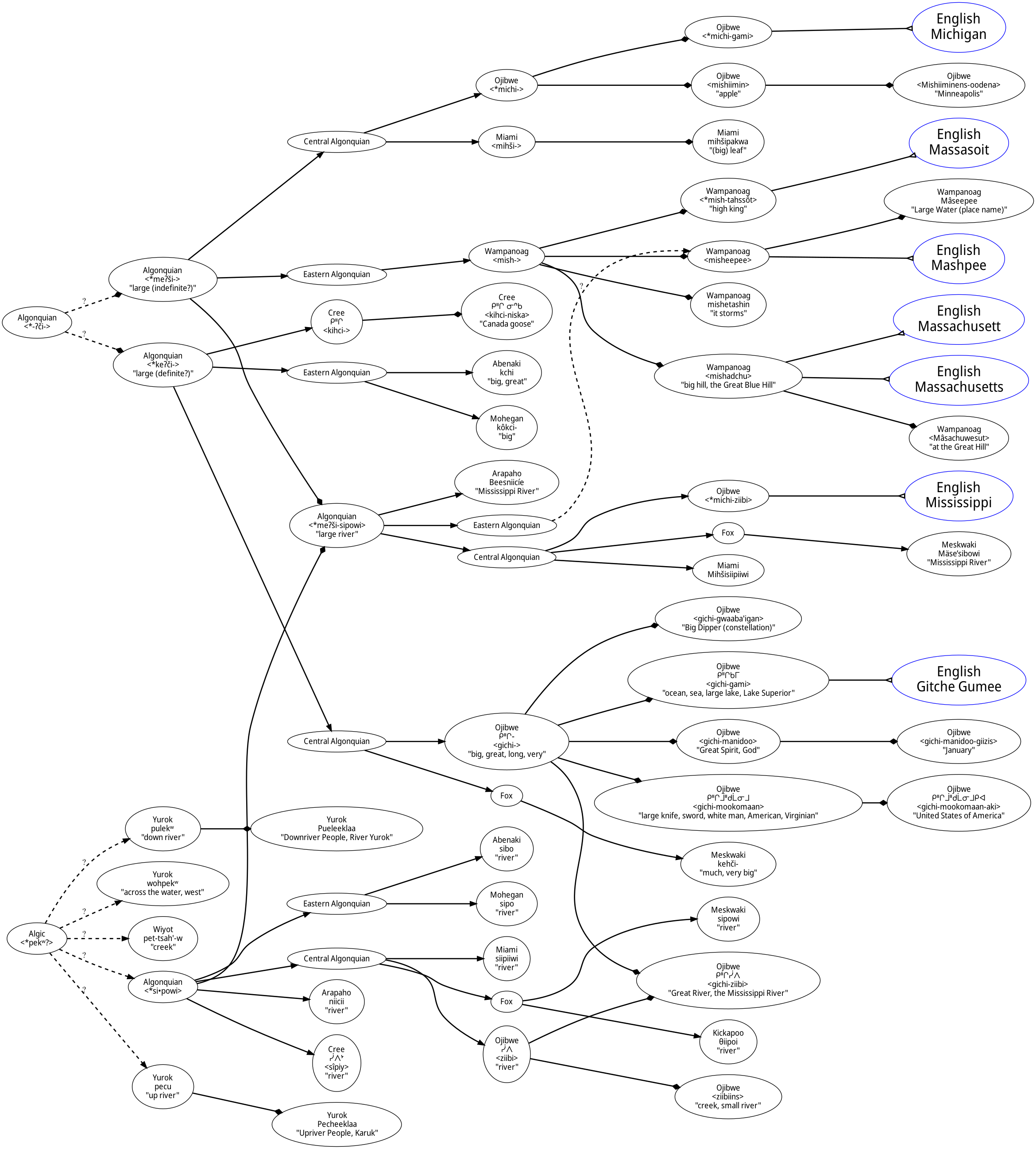Introduction
In which the US states of Mississippi, Michigan, and Massachusetts all have a common ancestor in Algonquian *meʔši-: "large".
But not Missouri. I checked 4 or 5 times because my mind kept rejecting the answer.
Teaser
Michigan, Mississippi, Massachusetts
Full Text
-
Algonquian *-ʔči-
-
Central Algonquian
- Ojibwe ᒋ- chi- big, great, long, very [1]
-
Algonquian *meʔši- large (indefinite?)
-
Central Algonquian
-
Miami mihši-
- Miami mihšipakwa (big) leaf
- Miami Mihšisiipiiwi
-
-
Eastern Algonquian
-
Wampanoag mish- [2]
-
Wampanoag mishadchu big hill, the Great Blue Hill
- Wampanoag Mâsachuwesut at the Great Hill
- English Massachusett
- English Massachusetts
-
Wampanoag misheepee
- Wampanoag Mâseepee Large Water (place name) [2]
- English Mashpee
-
Wampanoag *mish-tahssôt high king
- English Massasoit
- Wampanoag mishetashin it storms lit. "the wind becomes great"
-
-
-
Algonquian *meʔši-sipowi large river
- Arapaho Beesniicíe Mississippi River
-
Central Algonquian
-
Fox
- Meskwaki Mäse’sibowi Mississippi River
- Miami Mihšisiipiiwi
-
Ojibwe *michi-ziibi
- English Mississippi
-
-
Eastern Algonquian
-
Wampanoag misheepee
- Wampanoag Mâseepee Large Water (place name) [2]
- English Mashpee
-
-
-
Algonquian *keʔči- large (definite?)
-
Central Algonquian
-
Fox
- Meskwaki kehči- much, very big
-
Ojibwe ᑭᐦᒋ- gichi- big, great, long, very [1]
-
Ojibwe ᑭᐦᒋᑲᒥ gichi-gami ocean, sea, large lake, Lake Superior
- English Gitche Gumee
- Ojibwe ᑭᐦᒋᓰᐱ gichi-ziibi Great River, the Mississippi River
-
Ojibwe gichi-manidoo Great Spirit, God
- Ojibwe gichi-manidoo-giizis January lit. "Great Spirit Month"/"Great Spirit time"
-
Ojibwe ᑭᐦᒋᒨᐦᑯᒫᓂᒧ gichi-mookomaan large knife, sword, white man, American, Virginian
- Ojibwe ᑭᐦᒋᒨᐦᑯᒫᓂᒧᑭᐊ gichi-mookomaan-aki United States of America lit. "big knife land"/"white man land"
- Ojibwe gichi-gwaaba'igan Big Dipper (constellation)
- Ojibwe ᒋ- chi- big, great, long, very [1]
-
-
-
Cree ᑭᐦᒋ kihci-
- Cree ᑭᐦᒋ ᓂᐢᑲ kihci-niska Canada goose lit. "big goose"/"great goose"
-
Eastern Algonquian
- Abenaki kchi big, great
- Mohegan kôkci- big
-
-
-
Algic *pekʷ?
-
Yurok pecu up river
- Yurok Pecheeklaa Upriver People, Karuk
-
Yurok pulekʷ down river
- Yurok Pueleeklaa Downriver People, River Yurok
- Yurok wohpekʷ across the water, west
- Wiyot pet-tsah'-w creek
-
Algonquian *si•powi
-
Arapaho niicii river
- Arapaho Beesniicíe Mississippi River
-
Central Algonquian
-
Fox
- Kickapoo θiipoi river
-
Meskwaki sipowi river
- Meskwaki Mäse’sibowi Mississippi River
-
Miami siipiiwi river
- Miami Mihšisiipiiwi
-
Ojibwe ᓰᐱ ziibi river
- Ojibwe ziibiins creek, small river
-
Ojibwe *michi-ziibi
- English Mississippi
- Ojibwe ᑭᐦᒋᓰᐱ gichi-ziibi Great River, the Mississippi River
-
- Cree ᓰᐱᔾ sîpiy river
-
Eastern Algonquian
- Abenaki sibo river
- Mohegan sipo river
-
Algonquian *meʔši-sipowi large river
- Arapaho Beesniicíe Mississippi River
-
Central Algonquian
-
Fox
- Meskwaki Mäse’sibowi Mississippi River
- Miami Mihšisiipiiwi
-
Ojibwe *michi-ziibi
- English Mississippi
-
-
Eastern Algonquian
-
Wampanoag misheepee
- Wampanoag Mâseepee Large Water (place name) [2]
- English Mashpee
-
-
-
Visual
Collected English words
Michigan, Mississippi, Massachusett, Massachusetts, Mashpee, Massasoit, Gitche Gumee
Footnotes
-
^
There is almost certainly a connection between *meʔši-: "big" and *keʔči-: "big".
In modern Ojibwe, the Mississippi and Lake Superior are Gichi-ziibi and Gichi-gami, but English Mississippi and Michigan are understood to come from Ojibwe *Michi-ziibi and *Michi-gami. And there are all those other Algonquian languages use names for the Mississippi corresponding to the *meʔši- form. Also, there is Ojibwe mishiimin: "apple" which is presumably "large berry"—and the delightful bilingual pun Mishiiminens-oodena: "Mini-Apple Town" for "Minneapolis". Perhaps even funnier if mishiiminens is "big-berry-little".
In fact, Ojibwe also sometimes uses a reduced form chi instead of gichi, though that is considered informal and some Ojibwe elders proscribe it.
Since in Algonquian nouns are obligatorily possessed, *meʔši- vs. *keʔči- may be a fossilization of *me-ʔči: "somebody's large (noun)" vs. *ke-ʔči: "your large (noun)", perhaps acting like a indefinite/definite distinction.
-
^
It's unclear if Mâseepee is from *meʔši-nepyi: "Large Water" -> mâs-nippe or *meʔši-si·po·wi: "Large River" -> mâs-sipu. While mâs-sipu seems to be a better phonological fit, but the origin is generally considered to be *meʔši-nepyi, a better semantic fit.
Also Wampanoag names with "big, great" as transmitted through English consistently have a a vowel, or a â in revived Wampanoag, but words as recorded in written Wampanoag from the 18th century use a i vowel; such as Mâsachuw(esut) vs mishadchu. Possibly this is dialectical variation?
